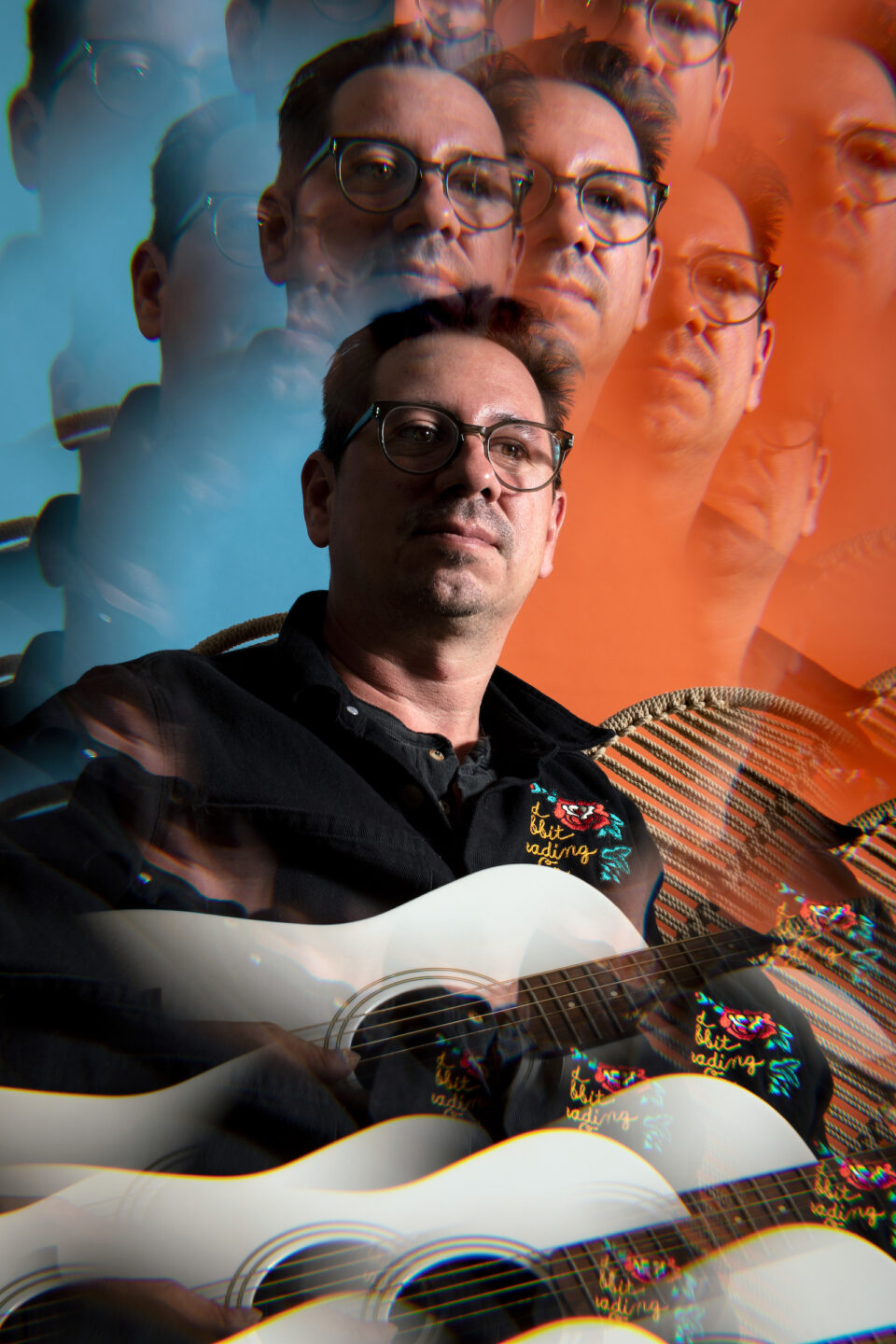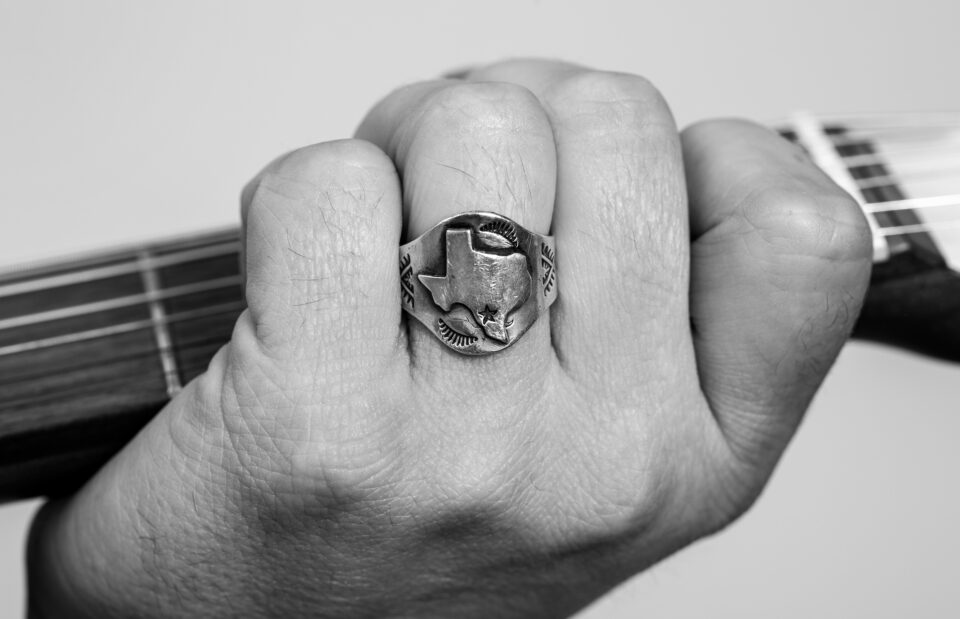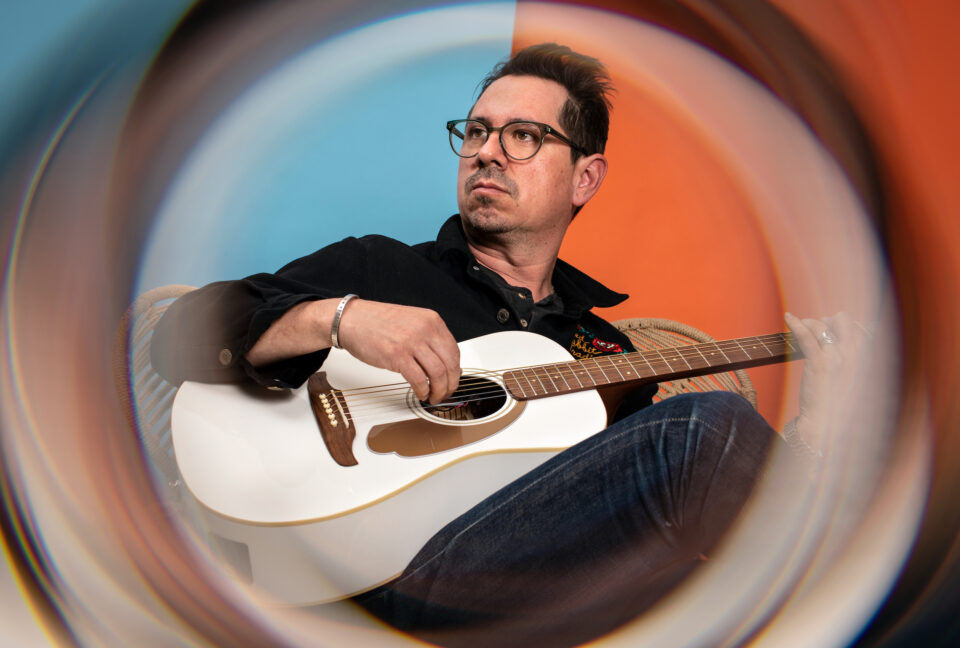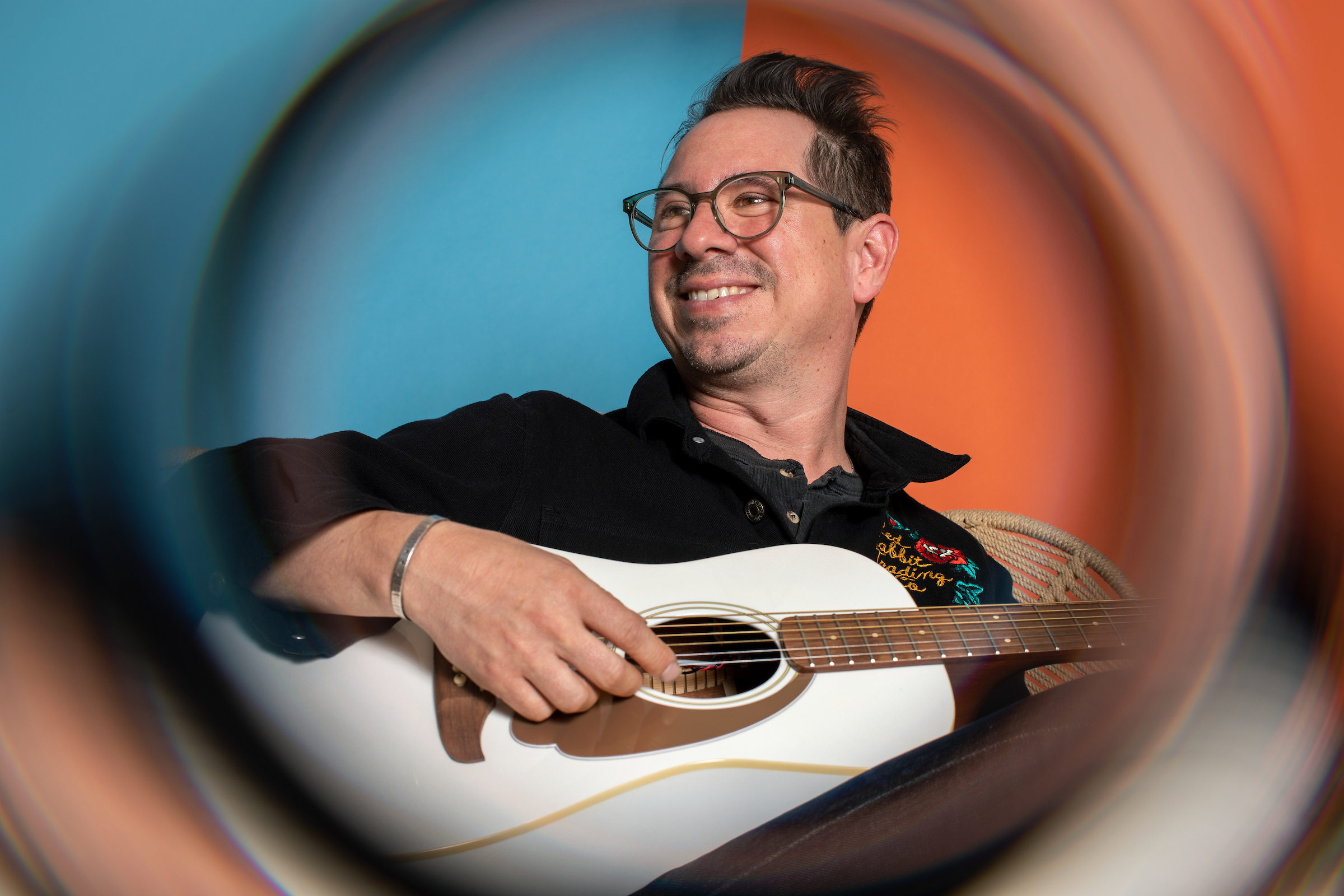There are moments on the new album from guitarist-producer Adrian Quesada that seem to cut off without warning, ending songs between notes, between breaths, leaving listeners hanging in a state of smoldering suspense. The dramatic device came naturally to Quesada during the making of Boleros Psicodélicos, his loving tribute to psychedelic baladas, as he sketched out the tracks alone in his Austin studio. “I like that cliffhanger thing—it’s like a movie,” Quesada explains. “It doesn’t quite resolve and it kind of leaves you with that uneasy feeling.”
The album was a passion project and an obsession, made possible only when the coronavirus sent the live music world into suspended animation, derailing his busy performing schedule with Black Pumas, the psychedelic soul band he leads with singer-guitarist Eric Burton. That touring schedule had become so full that it barely left time to get his laundry done during brief pitstops at home. Now he found his schedule cleared of all professional obligations, providing welcome downtime with family while inevitably sending him back into the comfort zone of a small recording studio he kept at home. “I grew up an only child, so I'm used to entertaining myself, left to my own devices,” he says. “I could lock myself away for days and just create.”

Guitarist-producer Adrian Quesada, co-founder of the Black Pumas, is releasing a new solo album, “Boleros Psicodélicos.” It is the Austin,Texas-based and Grammy-winning artist’s tribute to the golden era of balada music.
That’s how the Pumas happened. After leaving the Latin funk act Grupo Fantasma, he’d begun creating soul sounds that were dreamy but gritty, retro-cool and of the moment. Quesada is not a singer or lyricist, so his focus was on torrid layers of music. Meeting Burton completed the picture to “really bring it to life.”
The success of Black Pumas clearly opened up opportunities. He’d already won a GRAMMY with Grupo Fantasma, had toured the world, even performed with Prince—but the soul-stirring Pumas was a different kind of sensation, bringing wide acclaim, multiple GRAMMY nominations for their self-titled album, and new high expectations.
Black Pumas was released in the summer of 2019, but the duo didn’t rush out a follow-up. They’ve been working on new music since the debut, he says, with “tons of ideas, tons of stuff in various stages.” The result won’t be released until next year, largely to avoid recycling what they’ve already done. “I don't want to repeat artistically what we did, and fall into that formula too easy,” Quesada says. “The challenge is to take yourself out of your comfort zone.”
“I grew up an only child, so I’m used to entertaining myself, left to my own devices. I could lock myself away for days and just create.”
At the same time, a project like Boleros Psicodélicos allows him to make music where all that baggage and expectation doesn’t exist. The 12-song album takes traditional bolero structure into another dimension, while sharing the soulfulness he perfected with the Pumas. That puts Quesada amid an exciting moment for experimental Latin sounds, with stateside daredevils like Cuco and Chicano Batman leaning into what he calls “a psychedelic Latin sound.”
The project might have never stopped. With another 10 instrumental tracks waiting to be finished, he knew it was time to share what he had. “I get to a point where I want other people to hear it and I have to stop, because I'll just keep going forever,” says Quesada, who can imagine a second volume to Boleros Psicodélicos.

Quesada is in good spirits, sitting for an interview about the album during a short trip to Los Angeles. He wears a dark shirt embroidered with roses and a silver ring on his left hand in the shape of Texas—indented with a black star to mark the location of Laredo, his hometown.
“I’m no expert or musicologist about this stuff—I know what I like,” says Quesada, who grew up in a bilingual home where the daily soundtrack included records by Santana and Chicago, as well as “a lot of Mexican music.” But the side of Latin music explored on his new album was a much later discovery for him, an alternative movement that took in the experimental sounds of psychedelia. “It was very much in line with American psychedelic music. It crept into all this music around the world and this real old-school, traditional Latin song form and that’s what blew my mind.”
When his obsession began some 20 years ago, he couldn’t dial up a mountain of examples on Spotify or hear it on the soundtrack to Narcos. He had to search record bins and dig deep into the culture. In Austin, where he now lives, not even the esteemed Waterloo Records had much to offer. “I had to go to a mom-and-pop regional Mexican store and find it on a CD,” Quesada recalls. “I didn’t know it existed. I was like, ‘Oh my God, it's like a breakup song, but on acid!’ It was just the craziest thing.”
Making Boleros Psicodélicos was a musical exploration. Alone in his home studio, playing all the instruments and without the help of a recording engineer, he built layers of guitar, organ, percussion, and other instruments while recruiting a wishlist of vocalists from around the world. Midway into the pandemic, Quesada moved his gear into a bigger studio, but still had to work with his collaborators remotely to complete the project.
“I had to go to a mom-and-pop regional Mexican store and find [Latin psychedelic music] on a CD. I didn’t know it existed. I was like, ‘Oh my God, it’s like a breakup song, but on acid!’ It was just the craziest thing.”
The opening track is “Mentiras Con Cariño,” with smoldering, elegant vocals from former Calle 13 vocalist iLe. Beginning with a simple, hypnotic clacking beat, she warns knowingly of “sweet little lies.” Non-Spanish speakers will get the message from her delivery alone, aided by the aching, percolating arrangement of Quesada. Like other tracks on the album, the song immediately evokes a shadowy, smoky feeling of drama and emotion created by Quesada before a single lyric is sung.

Guitarist-producer Adrian Quesada, co-founder of the Black Pumas, is releasing a new solo album, “Boleros Psicodélicos.” It is the Austin,Texas-based and Grammy-winning artist’s tribute to the golden era of balada music.
“Not being a real lyrical person, I always want to make music that you can put on headphones and you can feel like you're transported someplace by the music,” he explains. “I like creating those colors where it can make you just visualize stuff. I was a visual artist originally, so I always just try to close my eyes and think, ‘If it's making you see a trippy cartoon, then that's the idea.’”
“Hielo Seco” is a tasty three-minute instrumental that travels deep into the funky and tropical, as Quesada trades licks with guitarist Marc Ribot and keyboard sound scientist Money Mark. Ribot had made a powerful impression on Quesada with his 1998 album The Prosthetic Cubans, an avant-garde reimagining of songs by the Cuban bandleader Arsenio Rodríguez. The sounds he heard there were a startling mix of cultures, music he now describes as “very old-school Cuban...but he was playing electric guitar and they were playing like a Casio keyboard. It was weird, but it was super-respectful of the music and also completely irreverent.”

Guitarist-producer Adrian Quesada, co-founder of the Black Pumas, is releasing a new solo album, “Boleros Psicodélicos.” It is the Austin,Texas-based and Grammy-winning artist’s tribute to the golden era of balada music.
Quesada connected with Ribot via Steve Berlin of Los Lobos and invited him to contribute to Boleros Psicodélicos. He then reached out to Money Mark (a.k.a. Mark Ramos-Nishita), best known for his work with the Beastie Boys, but whose groovy, analog solo album, 1995’s Mark’s Keyboard Repair, was an eye-opening and impactful listen for Quesada.
“Not being a real lyrical person, I always want to make music that you can put on headphones and you can feel like you’re transported someplace by the music. I like creating those colors where it can make you just visualize stuff.”
The album’s closing song is “El Muchacho De Los Ojos Tristes,” a cover of an effervescent love ballad from 1981 originally sung by Jeanette. Quesada heard the original for the first time when it was randomly discovered on TikTok by his then-13-year-old daughter. Quesada was already working on the Boleros Psicodélicos project, fueled on his obsessive listening to the most far-out baladas, but he was stunned by what he heard his daughter listening to one day at home. “I remember she was playing it and I’m like, ‘What is this? How have I never heard this?’” he recalls. “Jeanette was so amazing. She was Spanish and French, and just super cool.” His new version is sung by Tita, the sister of Guatemalan singer-songwriter Gaby Moreno (who sings the album’s “Puedes Decir De Mi”).
The nature of Boleros Psicodélicos meant that many of his collaborators were scattered far and wide: Guatemala, Mexico, Puerto Rico, Los Angeles. They were never all in the same room together. That makes the notion of touring with this project out of reach, but he hopes to at least host a few concerts of this music—most likely in LA or Austin—and bring together some of these artists and songs for the first time. “I think it would be important to document and have it brought to life,” he says.
Quesada is already back on the road with Pumas, making up for time lost during the pandemic. The first performance back in action was an invitation-only event in 2021, and the guitarist was startled by how much he missed being onstage. “Honestly I’m kind of a homebody and a studio rat, but I think COVID gave me the perspective to really appreciate how awesome it is to be able to tour and play live. I’ll never take that for granted again.” FL

Guitarist-producer Adrian Quesada, co-founder of the Black Pumas, is releasing a new solo album, “Boleros Psicodélicos.” It is the Austin,Texas-based and Grammy-winning artist’s tribute to the golden era of balada music.







